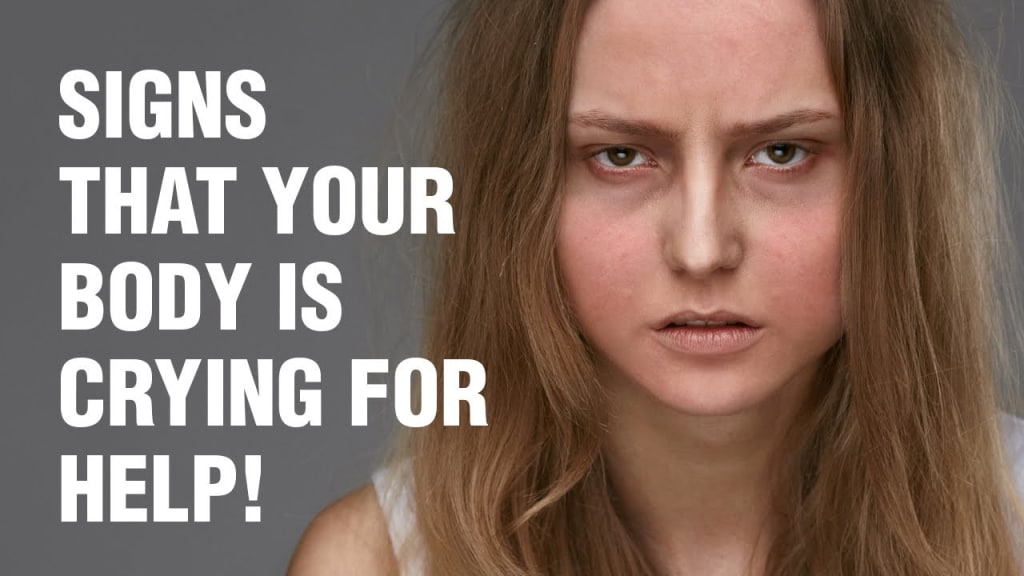17 Body Changes That Need Your Attention
No one knows your body better than you do, and you’re the first to notice when things aren’t as they should be. Even the smallest changes - feeling slightly off, or differences in your physical appearance can be signs from your body that something isn’t right with your health - and it’s always good to take notice. This doesn’t mean becoming a full-blown hypochondriac. Sometimes aches and pains are just that - but you shouldn’t let health issues go unchecked. Here’s a list of changes in your body that you need to pay attention to.

17 Body Changes That Need Your Attention
No one knows your body better than you do, and you’re the first to notice when things aren’t as they should be. Even the smallest changes - feeling slightly off, or differences in your physical appearance can be signs from your body that something isn’t right with your health - and it’s always good to take notice. This doesn’t mean becoming a full-blown hypochondriac. Sometimes aches and pains are just that - but you shouldn’t let health issues go unchecked. Here’s a list of changes in your body that you need to pay attention to.
Number 1 - Cracked Or Dry Lips Your lips can tell you a lot about your health. Dry or cracked lips could be a sign of an allergic reaction, so pay close attention to the cosmetics and the oral hygiene products you use. Allergic reactions can also result from foods and certain medications. Cracks and dryness in the corners of your mouth often indicate iron, zinc, and vitamin B deficiencies. Having dry eyes and dry mouth, along with enlarged parotid glands, excessive fatigue, and aches and pains, can be symptoms specific to Sjögren syndrome, an autoimmune disease.
Number 2 - Dark Circles Under Eyes While dark circles and sunken eyes often indicate that you aren’t getting enough sleep, they can be genetic as well. However, they can also be symptoms of a more serious issue, like dehydration. If your body isn’t getting the water it needs, the skin underneath your eyes gets darker, and your eyes appear sunken. Other signs of dehydration include decreased urine output, dry mouth, lethargy, and fatigue.
Number 3 - Leg Pain If you experience leg pain after a long flight or drive, don’t ignore it! Especially if your leg feels warm to the touch, and you notice redness and swelling. This could be a sign of deep vein thrombosis or DVT - a condition where blood clots form in one of the deep veins of your body - most often, in your legs. It’s more likely to occur after sitting down or being immobile for an extended period. But smoking, using birth control pills or hormones, pregnancy, or a recent surgery can also increase the risk of having DVT.
Number 4 - Cramps And Abdominal Pain Any type of intense cramps or abdominal pain should be a cause for concern. These symptoms are relatively common and often mistaken for stress, irritable bowel syndrome, or lactose intolerance. But they could also be an indication of an inflammatory bowel disease called Crohn’s Disease. Abdominal pain, along with intermittent cramps, chronic joint pain and fatigue, are all strong signs.
Number 5 - Eyebrow Loss Full eyebrows are not only on-trend, they’re also a significant indicator of your health. Of course, not everyone was born with thick, dark brows, and losing a few eyebrow hairs is nothing to be alarmed about. But if it’s excessive to the point of having bald patches, or even complete eyebrow loss, something’s definitely off. Eyebrow loss is a symptom of a variety of health issues. These include infections, certain skin conditions, hormonal changes, or an overactive immune system. It can also indicate excessive or insufficient levels of thyroid activity.
Number 6 - Nail Dystrophy Everyone knows what healthy nails look like, so any change in color or structure is immediately noticeable and should be given attention. Anemia and low iron levels often cause pale, thin-looking nails. While liver and gastrointestinal tract disorders, as well as fungal infections, are indicated by yellowing of the nails. A lack of zinc, copper, and iodine can cause white spots and stripes. And brittle nails are usually a result of a lack of vitamins, iron, calcium, and beta-carotene.
Number 7 - Dry Hands And Dry Skin On The Body Dry skin is normal during colder seasons and can be helped with adequate hydration, using moisturizers, and taking vitamins. If dry skin persists, however, it can also be a symptom of diabetes or hypothyroidism. Rough, peeling skin that is also tight and cracking could also be dermatitis caused by some sort of chemical exposure or fungal infection.
Number 8 - Persistent Cough A cough that doesn’t go away is not normal and could be a sign of a bigger issue. While it can be challenging to pinpoint the exact problem triggering a chronic cough, the most common causes are asthma and sinus problems, but it can also be a symptom of lung cancer. In most cases, a chronic cough usually disappears once the underlying problem is identified and treated.
Number 9 - Hair Loss People usually shed about 50 to 100 strands of hair a day. That’s because each hair follicle goes through specific phases - with the active hair growth phase lasting anywhere from 2 to 7 years. Once the active growth phase ends, the hair detaches itself from the blood supply and goes through a 2-3 month resting period while new hair begins to grow beneath it. So, at any time, about 80 to 90 percent of your hair is growing while the rest sheds or is in it’s resting period. Of course, genetics and aging are a factor when it comes to hair loss. However, if you start to notice a sudden, significant loss of of hair, it’s best to look into it - since many diseases and disorders can disrupt the hair growth cycle. These include certain autoimmune diseases, thyroid disorders, anemia, and polycystic ovary syndrome.
Number 10 - Snoring A common symptom that indicates health changes that most people may not even realize is snoring. Snoring once in a while isn’t a serious problem - it’s mostly an annoyance for your bedmate. But if you snore often or very loudly, you might need medical help, as it could also be a sign of something more serious. It could be a health problem such as obstructive sleep apnea or problems in your nose that can block your airways - such as a deviated septum or nasal polyps.
Number 11 - Foot Deformities Deformities or misalignments of the feet can sometimes be present at birth, but usually, they develop over time. Abnormal strains, or wearing the wrong shoes are common causes, along with other risk factors - such as being overweight, inflammation, osteoarthritis and rheumatoid arthritis. Deformities can also result from brain injury or stroke. Foot deformities are not only inconvenient and cause toes and other parts of the foot to become deformed too, they can also cause pain in the knees, hips, back, and the head.
Number 12 - Red Face Outside of natural physiological changes - such as temperature, alcohol consumption, or getting a massage - there are other reasons for getting a red face. For example, women over 40 often have episodes in which they suddenly feel hot and sweaty, and their face gets red and flushed due to decreased hormone levels. This indicates the beginning of perimenopause - the natural transition to menopause. While a warm, red face combined with excessive sweating, diarrhea, and shortness of breath could be a sign of Carcinoid Syndrome - an extremely rare condition that occurs in only about 10 percent of people who have a carcinoid tumor. A red face could also indicate demodicosis - which is caused by a sensitivity to an overpopulation of demodex mites that live in the hair follicles.
Number 13 - Discomfort In The Chest Heart attacks can cause severe chest pain. However, most people only experience some discomfort and a heavy feeling in their chest. There are usually a variety of other symptoms to go along with it - such as a cold sweat, nausea, heartburn, indigestion, or shortness of breath. If you experience chest discomfort along with any of these other symptoms, get to an E.R. as soon as possible!
Number 14 - Bathroom Habits Have Changed You probably have your own predictable pattern of bathroom visits - so pay attention if it suddenly changes. If bowel movements have become inconsistent or you have constipation or diarrhea, something could be going on. The same goes if you are experiencing frequent urination or any other bladder issues. These changes are often strong signs that there is an underlying problem, especially if they last for more than a week.
Number 15 - Dry Heels Many people experience this common irritation. Dry, cracked skin on your feet often indicates a lack of vitamins A and E. It can also be caused by a fungal infection - particularly if the cracks are accompanied by yellow toenails. If the problem persists after proper care and vitamin intake, it could be a sign of endocrine disruption.
Number 16 - Feeling Gassy While certain foods and drinks can make you gassy, if it’s an ongoing isue, it could be a sign that you have a candida overgrowth in your body - which is a type of yeast. A lot of people don’t know that yeast infections can commonly occur in the sinuses and intestines, and they can be rather problematic if ignored. Other symptoms you may experience are itchy ears, mouth sores, and fatigue.
Number 17 - Unintentional Weight loss If you aren’t actively trying to lose weight by exercising or dieting, you should definitely pay attention to any fluctuations in your weight. Unless you’ve changed your food or exercise routine, weight fluctuation over 10 pounds isn’t normal, especially losing 10 pounds or more. While unexplained weight loss can have many causes - from depression to type 1 diabetes, and even cancer - it’s usually a combination of things that result in the general decline of your health and weight.
Experiencing any of these changes is your body’s way of communicating to you that something is wrong, so don’t ignore it! Even just putting it off until later might worsen the problem. Persistent changes and multiple symptoms indicate something serious that might get out of hand if you don’t address it. Err on the side of caution because you could be harming yourself by just dismissing the problem as stress or something that will just “go away.” It’s better to be safe than sorry, so consult your doctor and express your concerns - your health is certainly worth a few blood tests or scans.






Comments
There are no comments for this story
Be the first to respond and start the conversation.